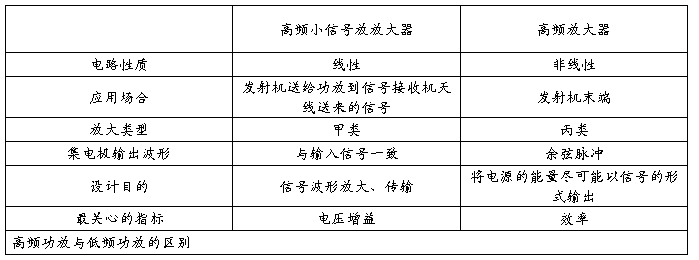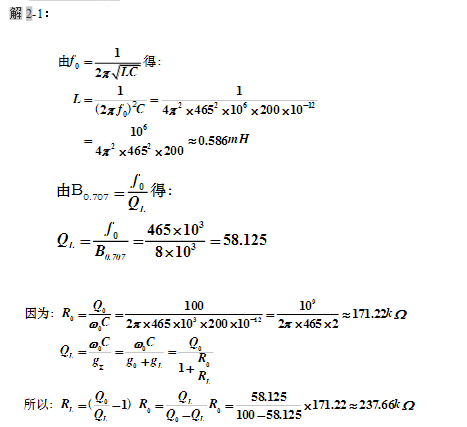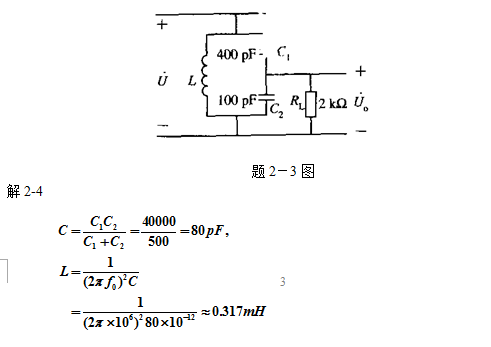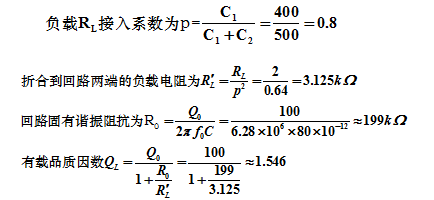高频知识点整理
高频电路原理与分析第五版
期末复习资料
编者:胡洪
(教材:西安电子科技大学)
专业:物联网工程
20##年6月1日
第一章 绪论
1.1 主要设计内容
1. 无线通信系统的组成
2. 无线通信系统的类型
3. 无线通信系统的要求和指标
4. 无线电信号的主要特性
1.2 关键名词解释
1. 基带信号:未调制的信号
2. 调制信号:调制后的信号
3. 载波:单一频率的正弦信号或脉冲信号
4. 调制:用调制信号去控制高频载波的参数,是载波信号的某一个或者几个参数(振幅、频率或相位)按照调制信号的规律变化。
1.3 知识点
1. 无线通信系统的组成(P1框图)
详细了解一下无线通信系统的促成部分和每个部分的作用
1) 高频振荡器(信号源、载波信号、本地振荡信号)
2) 放大器(高频小信号放大器及高频放大器)
3) 混频和变频(高频信号变换和处理)
4) 调制和解调(高频信号变换和处理)
2. 无线通信系统的分类
1) 按照工作频率和传输手段分为:中波信号、短波信号、超短波信号、微波信号、卫星通信
2) 按照通信方式分:全双工、半双工、单工方式
3) 按照调制方式分:调幅、调频、调相、混合调制
4) 按照传输发送信息的类型:模拟通信、数字通信
3. 无线信号的特性:时间特性、频率特性、频谱特性、调制特性、传播特性
4. 无线通信采用高频信号的原因:
1) 频率越高,可利用的频带宽度越宽,可以容纳更多许多互不干扰的信道,实现频分复用或频分多址,方便某些宽频带的消息信号(如图像信号
2) 同时适合于天线辐射和无线传播。
5. 调制的作用:
1) 通过调制将信号频谱搬至高频载波频率,使收发天线的尺寸大可缩小
2) 实现信道的复用,提高信道利用率。
第二章 高频电路基础与系统问题
2.1 主要设计内容
1. 高频电路中的元器件
2. 高频率电路中的组件
2.2 关键名词解释
1. 参数效应:在高频信号中,随着信号的提高,元件(包括导线)产生的分布参数效应和由此产生的寄生参数(如导体间、导体或元件与地之间、元件之间的杂散电容,连接元件的导线的垫高和元件自身的寄生电感)。
2. 趋肤效应:在频率升高时,电流只集中在导体的表面,导致有效导电面积减小,交流电阻可能远大于直流电阻,从而是导体损耗增加,电路性能恶化。
3. 辐射效应:信号泄漏到空间中,就使得信号源或要传输的信号能量不能全部传输带负载上,产生能量损失和电磁干扰。
4. 品质因素Q:谐振电路中所储能量同每周期损耗能量之比。
5. 谐振频率:简单振荡回路的阻抗在某一特性的频率上具有最大或最小值得特性(电抗为零时的频率)。
6. 失谐( ):表示频率偏离谐振的程度,
):表示频率偏离谐振的程度, 。
。
7. 广义失谐( ):
): 
8. 回路带宽( ):保持外加信号幅值不变改变其频率,将回路电流值下降为谐振值得的
):保持外加信号幅值不变改变其频率,将回路电流值下降为谐振值得的 对应的频率范围成为回路的通频带,
对应的频率范围成为回路的通频带, 。
。
9. 抽头并联振荡回路:激励源或负载回路电感或电容部分连接的并联振荡回路。
10. 抽头系数 (p):与外电路相连的那部分电抗与本回路参与分压的同性质的总电抗之比。(外电路:等效电源分析法是分析复杂电路的一种方法,具体做法是把复杂电路分为电源电路部分、外电路部分,即复杂电路=电源电路部分+外电路.目的是为了方便分析外电路,先把电源电路部分简化一下,用一个简单的电源来代替,这样就不用考虑电源电路部分的内部各分支电路、各元件电流电压随外电路参数变化,从而降低的电路分析难度.因此说:“电源等效是对外电路而言的”.)
11. 耦合振荡回路(双调回路):两个互相耦合的振荡回路。
12. 耦合系数(k):两电感元件间实际的互感(绝对值)与其最大极限值之比
( )。
)。
13. 矩形系数:(矩形系数描述了滤波器在截止频率附近响应曲线变化的陡峭程度,滤波器选择性好坏的一个参量) ,矩形系数越接近1越好。
,矩形系数越接近1越好。
2.3 知识点(P19例2-1、P22例2-2)
1. 高频中的无源器件:电阻(器)、电容(器)、电感(器)。
2. 高频中的有源器件:二极管、三极管、集成电路。
3. 高频中的无源组件(无源网络):高频振荡回路(应用最广泛)、高频变压器、谐振器(完成信号的传输、频率选择、阻抗变换)
4. 电阻(器)在高频中使用时,不仅表现出电阻特性,还表现出电抗特性(高频特性)。
5. 高频特性:金属膜电阻 > 碳膜电阻 > 线绕电阻。
6. 电容器:当工作频率小于自身谐振频率是,电容器呈现电容特性;当工作频率大于自身谐振频率,电容器等效一个电感。
7. 在电感中,Q值越高,表明电感器的储能能力越强,损耗越小。
8. 二极管在高频电路的主要作用:检波、调制、解调、混频。
9. 简单谐振回路具有频率谐振特性和频率选择特性。
10. 串联谐振回路:
1) 串联谐振角频率  ,当
,当 ,回路成电容性,
,回路成电容性, (
( 为电感线圈L中的损耗电阻);当
为电感线圈L中的损耗电阻);当 ,回路呈电感特性;
,回路呈电感特性; ;当
;当 ,回路呈电阻特性
,回路呈电阻特性
2)  ,
, 为品质因数(远大于1),
为品质因数(远大于1), 越高,回路的选择特性越好(矩形系数也是反映回路选择性好坏的另一个参数)。
越高,回路的选择特性越好(矩形系数也是反映回路选择性好坏的另一个参数)。
3) 串联谐振回路电阻、电感、电容上的电压值与阻抗值成正比,串联谐振时电感及电容上的电压为最大,其值为电阻上的电压值的 倍,也就是恒流源的
倍,也就是恒流源的 倍。
倍。
4) 发生谐振的物理意义:电容中的存储的能量和电感中的磁能周期性变换,并且存储的最大能量相等。
11. 并联谐振回路:
1) 并联谐振角频率: ,
, ;当
;当 ,
, ,回路在谐振时的阻抗最大,为一电阻
,回路在谐振时的阻抗最大,为一电阻 ,
,
2) 并联回路通常用于窄带系统,此时 相差不大,则有:
相差不大,则有:
3)  值越大,选频性就越好,所以注意P18图2-7的几幅图中对比
值越大,选频性就越好,所以注意P18图2-7的几幅图中对比 不同,对应的
不同,对应的 的图像。
的图像。
4) 谐振时,有
5) 当 ,回路成电感性;当
,回路成电感性;当 ,回路呈电容性;当
,回路呈电容性;当 ,回路呈电阻特性
,回路呈电阻特性
12. 抽头并联振荡回路
1) 抽头系数为 :
:
2) 谐振时,输入端呈现的电阻为 ,从功率相等来看,
,从功率相等来看, ,
, ;同理在失谐不大的情况下,有
;同理在失谐不大的情况下,有 。
。
3) 根据功率相等,有 ,
, 
4) 在抽头回路中,谐振回路的回路电流( )比
)比 要小些,所以有
要小些,所以有 ,可得:
,可得: 。
。
13. 耦合振荡回路
1) 耦合振荡回路的作用:一是用来进行阻抗变换以完成高频信号的传输,二是形成简单振荡回路更好的频率特性。
2) 通常应用时满足两个条件:两个回路都对信号进行频率调谐;另一个是都为高Q电路。
3) 耦合因子A=kQ,A>1,k>k0过耦合;A<1,k<k0,欠耦合;A=1,k=k0,临界耦合,此时的耦合系数为临界耦合系数;在临界耦合时有: (注意P24图2-13的图形)
(注意P24图2-13的图形)
4) 反射阻抗反应的是刺激线圈对初级线圈的反作用,所以为
15. 高频晶体管有两大类型:一类是作小信号放大的高频小功率管,对他们的主要要求是高增益和低噪声;另一类是高频功率放大管,除了增益之外,要求其在高频有较大的输出功率。
16. 阻抗变换的目的是实现阻抗匹配,阻抗匹配时负载可以得到更大的功率。
第三章 高频谐振放大器
3.1 主要设计内容
1. 高频小信号谐振放大器
2. 高频谐振功率放大器
3.2 关键名词解释
1. 相对频带宽度:信号的带宽与中心频率宽度之比
3.3 知识点
高频小信号:
1. 高频小信号放大器基本类型是频带放大器,频带放大器是以选频电路作为负载,兼具阻抗变化和选频滤波的功能。(并联谐振电路、耦合回路)
2. 高频小信号的基本要求:
1) 增益要高
2) 频率选择性要好(选择性是描述所需信号和抑制无用信号的能力,放大器的频率的两个重要参数是频带宽带和矩形系数)
3) 工作稳定可靠。
3. 高频小信号放大器的工作原理:与低频小信号放大器是一样的原理,负载电路用选频电路替代了
4. 性能分析
1) Y参数模型
2) 提高稳定性的方法:一是减小晶体管的反向传输导纳Yre,而是从电路上设法消除晶体管的反向作用,使它单向化,具体有中和法和适配法。
高频功率放大器:
5. 简单介绍:
1) 高频功率放大器的构成:电源、偏置电路、晶体管、谐振回路、输入回路
2) 高频功率放大器选用谐振回路作为负载,保证了输出电压相对于输入电压不失真,还具有阻抗变换的作用(阻抗变换的目的是为了阻抗匹配,使负载得到更大的功率);同时使用谐振回路可以保留有用信号,滤除无用分量
6. 高频功放的能量关系
在集电极中,谐振回路得到的高频功率(高频一周的平均功率)即输出功率P1
集电极电源供给的直流输入功率为
集电极损耗功率Pc:
集电极效率 (
( ,
, )
)

提高 集电极效率的目的是为了提高晶体管的输出功率
负载特性: 临界状态的输出功率最大,效率也最高,通常应选择这状态;过压状态的特点是效率高,损耗小,并且输出电压受负载电阻RL的影响小,近似恒压源的特性;欠压状态的特点是电流受负载电阻RL的影响小,今夕交流恒流源特性,但次状态的效率太低。
7. 高频功放的工作原理和动态特性详细见P75-P79以及例题3-1
8. 高频功放的外部特性:放大器负载 、激励电压
、激励电压 ,偏置电压
,偏置电压 和
和 。
。
9. 高频功率放大器的高频效应(P85)
10. 高频功率放大的实际线路(P87)
直流馈电线路
1) 集电极馈电线路:串联馈电路、并联馈电路
2) 在串联馈电路中: 的作用是阻止高频电流流过电源,防止产生不希望的寄生反馈;
的作用是阻止高频电流流过电源,防止产生不希望的寄生反馈; 的作用是提供交流通路(
的作用是提供交流通路( 的值应使它的阻抗远小于回路的高频阻抗,为有效地阻止高频电流流过电源,
的值应使它的阻抗远小于回路的高频阻抗,为有效地阻止高频电流流过电源, 呈现的阻抗应远大于
呈现的阻抗应远大于 的阻抗)
的阻抗)
3) 并联和串联馈的电线路的优缺点比较:串联馈电线路的有点是 、
、 处于高频地电位,分布电容不影响回路;并联馈电线路的优点是回路一端处于直流地电位,回路L,C元件一端可以接地,安装方便。
处于高频地电位,分布电容不影响回路;并联馈电线路的优点是回路一端处于直流地电位,回路L,C元件一端可以接地,安装方便。
基极馈电线路:串联和并联两种
第四章 正弦波振荡器
4.1 主要设计内容
1. 正弦振荡器的原理
2. LC振荡器
3. 判断是那种反馈
4.2 关键名词解释
1. 振荡器:在没有激励信号的情况下产生周期性振荡信号的电子电路
2. 反馈型振荡器:有放大器和反馈网络组成的一个闭合环路。
3.
4.3 知识点
1. 反馈振荡器的工作原理(P105-P106)
2. 自激振荡的条件为环路增益为1( )
)
注意:
3. 平衡条件为 ,
,
注解:
 :为放大器的相位
:为放大器的相位
 :为反馈网络的相位
:为反馈网络的相位
 :为晶体管正向转移导纳的相位
:为晶体管正向转移导纳的相位
 :反馈系数的相位
:反馈系数的相位
1) 也可以表示为:
 振幅条件
振幅条件
 相位条件
相位条件
2) 考虑晶体管的输入电阻的影响,它也会随信号大小稍有变化(主要考虑对 的影响),引入一个与
的影响),引入一个与 反号的系数
反号的系数

平衡条件可以写成:
4. 起振条件
 ,为自激振荡条件,也可以写成
,为自激振荡条件,也可以写成
 振幅条件
振幅条件 相位条件(正反馈条件)
相位条件(正反馈条件)
5. 稳定条件
 (
( 振幅条件
振幅条件
 相位条件
相位条件
6. 三端振荡器能否振荡的原则:
1) X1和X2的电抗性质相同
2) X3与X1,,X2电抗性质相反
7. 电容反馈振荡器(考必兹振荡器)
1) 振荡频率:
2) 总电容:
3) 谐振频率:
4) 反馈系数大小:
8. 电感反馈振荡器(哈特莱振荡器)
1) 振荡频率:
2) 总电感:
3) 谐振频率:
4) 反馈系数大小:
高频补充知识点:
1. 高频电路中完成信号的放大、非线性变换等功能的有源器件主要是二极管、晶体管、集成电路
2. 振荡器谐振的条件:阻抗取得最大或者最小的时候(或者说电抗为0)
3. 高频振荡器根据集电极电流是否进入饱和区可以分为欠压、临界、过压三种状态
4. 自激振荡
概念:不外加激励信号而自行产生的恒稳和持续的振荡
条件:
5. 高频小信号放大器和高频功率放大器的区别和联系:
区别:


1.对于收音机的中频放大器,其中心频率为f0=465KHz,B0.707=8KHz, 回路电容C=200PF。试计算回路电感和QL值,若电感线圈的Q0=100,问在回路上应并联多大的电阻才能满足要求?
解:
2.图为一电容抽头的并联谐振电路,谐振频率为1MHz,C1=400PF,C2=100PF,求回路电感L。若Q0=100,RL=2K?,求回路有载QL值。


第二篇:中考英语高频知识点整理总结
历年中考英语高频知识点整理总结
1. stop to do sth. 和stop doing sth.
“stop to do sth。” 表示停止做其它事情而去做“to do sth。”所表示的事情,可以将“to do sth。”理解成“stop”的目的状语;“stop doing sth。”表示不做“doing sth。”所表示的事情。
例如: “Stop talking. Let’s begin our class。” said the teacher. 老师说:“别说话了,让我们开始上课。”
We have kept doing our homework for a long time. Let’s stop to listen to music. 我们做家庭作业很长时间了,让我们停下来听听音乐。
2.forget to do sth。和forget doing sth. (remember to do sth. 和remember doing sth。)
“forget to do sth。”表示将来不要忘记做某事,谈的是未来的事情;“forget doing sth。”表示忘记过去应该做的事情。
例如: “Don’t forget to do your homework。” said the teacher before the class was over.
老师在下课前说:“不要忘记做家庭作业。”
“I’m sorry. I forgot doing my homework. May I hand it in this afternoon, Mr. Chen?” said Li Ming.
李明说:“对不起,我忘记做家庭作业了。我今天下午交好吗,陈老师?”
3.have sth. done。(过去分词)(让别人)做某事
例如:I had my hair cut yesterday afternoon. 我昨天下午理了发。 My computer can not work now. I must have it repaired. 我的电脑有故障了,我必须让人修好它。
4. 感官动词后接不带to的不定式或者现在分词的区别
例如:see sb. do sth。看见某人(经常)做某事 和see sb. doing sth。看见某人(正在)做某事
I often see him do exercise in the morning. 我经常在早晨看见他锻炼身体。 When I was walking in the park, I saw him drawing a picture there. 当我在公园散步的时候,我看见他正在那里画画。
5. 在主动语态中,感官动词(see, hear, feel, watch等)和使役动词(make, have, let等)要求接不带to的不定式做宾语补足语,而在被动语态里,不定式要带上to。
例如:The boss often made the workers work 10 hours a day.
The workers were made to work 10 hours a day.
She was heard to use strong language. 听说她骂人了。
6.常用的几个和不定式有关的句型:
Why not do sth? 为什么不做某事?
It takes/took sb. some time to do sth. 做某事花了某人多长时间。
It is/was +形容词+(for sb。) +to do sth. 做某事(对某人来说)怎么样。
7. 介词后面一般接动名词。同学们要特别注意介词to和不定式符号to的区别,例如下面的词组一定要记清:
prefer doing sth. to doing sth. 喜欢做??不喜欢做??
look forward to doing sth. 期待/盼望做某事
make a contribution to doing sth. 为??做出贡献
8. 现在分词和过去分词做定语的区别
A. 现在分词含有正在进行的意思,而过去分词含有被动或者已经完成的意思,如:
a developing country 发展中国家 a developed country 发达国家
boiling water 正在沸腾的水(一般情况下水温为100℃) boiled water 开水(已经烧开的水,水温可以依然很高,也可以是凉白开)
a boy named Jim 一个叫Jim的男孩
B. 有些动词的现在分词和过去分词都具有形容词特征,但是它们的意思有区别。它们的-ing形式往往用来说明事物的特征;他们的-ed形式表示被动的意思,用来说明人的情况。
I am interested in this interesting story. 我对这个有趣的故事感兴趣。
I am moved at the moving sight. 我被这动人的情景感动了。
They were amazed at the amazing facts. 他们对那些令人惊异的事实感到惊奇。
一、出现以下词,用do填空:
can , could, may, must, need, had better, why not, make, have to, let's, see, hear, watch, notice, Will ( Would ) you please??
二、出现以下词,用to do 填空:
would like, want, begin, start, hope, decide, ask, wish, have
something to do, tell, take time, it's time, remember, forget, learn, teach, try, stop, plan, adj./疑问词后,take ,allow, encourage, warn, It's +形容词+to do something, discuss, know, refuse, invite , get order, like, offer, lend, make up one's mind to do, set one's mind to do, enough, need
三、出现以下词,用doing 填空:
finish, like, enjoy, mind, keep, be busy, there be, do some?, go doing, prevent, be worth, spend, practice, feel like, thank somebody for doing something ,stop, excuse somebody for doing something, can't help,
prefer?to?,look forward to?hate, mention, have fun doing,介词:at, in , on, of , from, for, about, with, without, ,make a contribution to, be used to, hear, see, watch, notice, listen,
四、基数词的特殊变化
one---first ; two---second; three---third; five---fifth;
eight---eighth; nine---ninth; twelve---twelfth; twenty---twentieth; twenty-one---twenty-first
五、代词的变化:
主格―――宾格――所有格(adj.)――所有格(n.)―反身代词
I --------me--------my----------mine-------------myself
you------you--------your-------yours------------yourself
he-------him---------his-------his-------------himself
she------her----------her-------hers-----------herself
it-------it----------its--------its--------- itself
we-------us---------our---------ours------------ourselves
you------you--------your--------yours---------yourselves
they-----them------their--------theirs---------themselves 记住100组同义词
2011-05-30 来源:新浪博客
1. 一??就??
as soon as
the moment,
the minute,
immediately,
the instant,
instantly
2. 尽可能
as ? as possible
as?as you can
3.乐意做??
be glad to do sth。
be pleased to do sth。
be happy to do sth。
be delighted to do sth。
have pleasure to do sth。
4.准备做??
get ready for sth。
get sth. ready
be ready for sth。
be ready to do sth。
prepare for sth。
prepare oneself for sth。
prepare to do sth。
prepare sth. for sb。
be prepared for sth。
5. “邀请”与“请求”
Would you like to do sth.?
Would you like sth.?
Would you please do??
(回答:I’d love to 。)
6.“没用”
It is no use (in)doing sth。
There is no use doing sth。
It is useless to do sth。
It is no good (in) doing sth。
7. “结果”
so ?that?
enough to do sth。
too ? to?
8. “花费”
sb. spends some time/money on sth
sb. spends some time/money (in) doing sth。 sb. pays some money for sth。
sb. buy sth. for some money。
(sb sells sth. for some money。)
sth. costs sb. some time/money
It costs sb. some money/time to do sth。 It takes sb. some time/money to do sth。
It takes some time/money for sb. to do sth。
9. “为了”
so that (引导目的状语从句)
in order that (引导目的状语从句)
so as to do sth. (引导目的状语,只位于句尾) in order to do sth. (引导目的状语,可首可尾) to do sth. (引导目的状语,可首可尾)
10. “以至于不”
too?to?
so ?? that?not?。.
not?enough to?
11. “习惯”
be used to doing sth。
be accustomed to doing sth。
12. 表示建议的表达
What about sth./doing sth.?
How about sth./doing sth.?
Why not do sth.?
13. “出什么毛病了”
What’s the matter with??
What’s wrong with??
What’s the trouble with?? What happens to??
14. “为什么不”
Why not do sth.?
Why don’t you do sth?
15. “不但??而且??” not only?but also
not only?but?
not only?but ?as well
16.“劝阻”“阻止”
stop sb. from doing
keep sb. from doing
prevent sb. from doing
discourage sb. from doing sth。 dissuade sb. from doing sth。
17. “相处”
get on with sb。
get on well with sb。
get along with sb。
get along well with sb。 mix with sb。
mix well with sb。
18. “因为”
thanks to
due to
because of
as a result of
owing to
19.“形式”
It’s + adj. (for/of sb. ) to do sth. (形式主语) find/think/feel it + adj. + to do sth. (形式宾语)
20. stress 句型汇总
be stressed out
be under a lot of stress
takestand the stress 忍受压力
put stress on sth. 强调
21. “弥补”
make up for
compensate for
22. “在?看来”
in one’s opinion,
to one’s mind
in one’s view
in one’s eye
according to sb.
23. “丢”
be lost
be missing
be gone
24. “著名”
be famous for sth.
be famous to sb.
be famous as + 职位
be famous to sb. as+ 职位 be known for sth.
be known to sb.
be known as+ 职位
be known to sb. as+ 职位
25. “满意”
be satisfied with
be pleased with
be happy with
be delighted with
26. “为??而高兴”
be pleased for sb
be happy for sb.
be glad for sb.
be delighted for sth.
27. “祝贺”
congratulate sb. on sth.
congratulations to sb. on sth.
28. “道歉”
apologize to sb. for sth.
make an apology to sb. for sth.
29. “玩得高兴”
have a good time
have fun (doing sth.)
enjoy oneself
30. “决定”
decide to do sth.
make a decision to do sth. determine to do sth.
be determined to do sth.
make a determination to do sth resolve to do sth.
make a resolution to do sth. make up one’s mind to do sth. set one’s mind to do sth.
31. “使役”
make sb. do sth.
let sb. do sth.
have sb. do sth.
get sb. to do sth.
set sb. to do sth.
32. to表示 “的”
the key to the door
the key/answer to the question
the solution to a problem
the way to sp.
the entrance to sp.
be on a visit to sp.
pay a visit to sp.
a trip to sp.
a ticket to sp. (a ticket for + 比赛名称)
33. “花了”
pay some money for sth.
spend some money on sth.
buy sth. for some money.
cost sb. some money
34. “怎么样”怎么样表达?
What do you think of sth.?
How do you like sth.?
What’s your view on sth.?
How do you feel sth.?
What’s your opinion about sth?
35. 对??的态度:
be kind to sb.
be nice to sb.
be friendly to sb.
be amiable to sb.
be polite to sb.
be respectful to sb. be impolite to sb.
be rude to sb.
be mean to sb.
be patient with sb. be impatient with sb.
be angry with sb. at sth. be mad with sth.
be strict with sb. in sth.
36. 疑问词+动词不定式 what to do
how to do sth.
where to do sth.
when to do sth.
whether to do sth.
37. “刚??就??” hardly?when?
no sooner? than?
be about to do sth. when?
38. like句型汇总
like sth./sb.
like doing sth
like to do sth.
would like to do sth.
would like sth.
feel like doing sth.
feel like sth.
look like?
what’s ? like?
39. need句型汇总
need sth/sb.
need to do sth.
need sb. to do sth.
need doing sth. =
need to be done
needn’t do sth.
Need?do sth.?
(need 作情态动词时常用于否与疑) in need of = in want of
in great need of
meet the needs of
40. “到达”
get to sp.
arrive in/at sp.
reach sp.
41. interest句型汇总
be interested in sth.
have interest in sth./doing sth interest sb. in sth./doing sth. lose interest in sth/doing sth
It’s interesting (for sb.)to do sth. a place of interest
42. tell句型汇总
tell sb. sth.
tell sth. to sb.
tell sb. about sth.
tell sb. to do sth.
tell sb. not to do sth.
tell A from B
tell the difference between A and B
43. “相同”
be the same as
look like
be similar to
44. “拜访”
call at sp
call on sb.
drop in at sp.
drop in on sb.
注意call on 还有“号召”的意思,句型为
call on sb. to do sth.
45. hope与wish句型汇总
hope to do sth.
hope that??
wish to do sth.
wish sb. to do sth.
wish that?
hope sb. to do sth. (╳)
46. “翻译”
translate ? into?
turn ? into?
change ? into?
47. suggest句型汇总
suggest that??(虚拟语气) suggest to sb. that??
suggest that??(表明 )
suggest doing sth.
suggest sb. to do sth. (╳)
48. advise句型汇总
advise sb. against sth/doing sth advise sb. to do sth.
advise sb. not to do sth.
49. ?to doing sth汇总
look forward to doing sth.
devote oneself to doing sth.
devote one’s life to doing sth.
pay attention to doing sth.
be used to doing sth.
be accustomed to doing
stick to doing sth. 坚持做??
adapt to doing sth.
admit to doing sth.
apply to doing sth.
be addicted to doing sth.
be dedicated to doing sth. 致力于;献身于
be indifferent to doing sth.
be opposed to diong sth.
be similar to doing sth.
get down to doing sth.
give one’s mind to doing sth.
give rise to doing sth.
lead to doing sth.
object to doing sth.
prefer doing A to doing B
respond to doing sth.
take to doing sth. 喜欢上;从事;养成?的习惯;沉湎于? turn to doing sth.求助;转而从事于
in addition to doing sth.
50. “容忍”
put up with
stand
bear
tolerate
endure
51. “对??厌烦”
be tired of
be fed up with
be sick of
be bored with
52. tired句型概览
be tired of 对?厌倦,对??烦
be tired with/from sth./doing sth. 因?感到疲劳 be tired out 精疲力竭 (=be exhausted)
53. “擅长”
do well in sth.doing sth.
be good at sth.doing sth.
be expert at sth.doing sth.
be clever at sth.doing sth.
be great at sth.doing sth.
be excellent at sth.doing sth.
be skilled at sth.doing sth.
be adept at sth.doing sth.
54. “弱”
be weak in
be bad at
be poor at
55. 感叹句句型汇总
what + a/an + adj + [C] + 主+ 谓! What + adj+ pl./[u] +主+ 谓!
How + adj/ adv + 主+ 谓!
How + 句子!
56. “双宾语”总揽
show sb. sth →→ show sth. to sb. pass sb. sth. →→ pass sth. to sb. post sb. sth. →→ post sth. to sb. give sb. sth →→ give sth. to sb. take sb. sth. →→ take sth. to sb. lend sb sth. →→ lend sth. to sb. throw sb. sth. →→ throw sth. to sb. do sb. harm →→ do harm to sb.
offer sb. sth. →→ offer sth. to sb. wave sb. sth. →→ wave sth. to sb. tell sb. sth. →→ tell sth. to sb. send sb. sth. →→ send sth.to sb. wish sb. sth. →→ wish sth. to sb. read sb. sth. →→ read sth. to sb.
teach sb. sth. →→ teach sth. to sb.
telegraph sb. sth. →→ telegraph sth. to sb. sing sb. sth. →→ sing sth. to/for sb. write sb. sth. →→ write sth. to sb.
save sb. sth. →→ save sth. for sb.
order sb. sth. →→ order sth. for sb. pour sb. sth. →→ pour sth. for sb.
make sb. sth. →→ make sth. for sb.
buy sb. sth. →→ buy sth. for sb.
cook sb. sth. →→ cook sth for sb.
get sb. sth. →→ get sth. for sb.
win sb. sth. →→ win sth. for sb.
His hard work won him a lot of praise.
His hard work won a lot of praise for him. leave sb. sth. →→ leave sth. for sb.
57. “毛病”
there is sth. wrong with sth./sb.
sth. is wrong with ?? →
58. doing与to do,意思别模糊
forget doing sth. 做了忘了
forget to do sth. 忘了做了
remember doing sth. 记得已做
remember to do sth. 记住要做
stop doing sth. 停止做
stop to do sth. 停下来去做
watch/see/hear sb. doing sth. 看/听见在做 watch/see/hear sb. do sth. 看/听见做 go on doing sth. 继续做(同一件事)
go on to do sth. 继续做(另一件事)
try doing sth. 努力做
try to do sth. 尝试做
mean doing sth. 意味着?
mean to do sth. 打算做
learn doing sth. 学过? (不一定会) learn to do sth. 学会做
59. “告别”
wave sb off 挥手告别
wave goodbye to sb.
say goodbye to sb.
see sb. off
60.给某人打电话
call sb
ring sb.
call up sb.
ring up sb.
phone sb
phone sb. to do sth.
give sb a phone
give sb. a call
call sb. at+电话号码
dial +电话号码
61. “吃惊”
be surprised at
be amazed at
be astonished at
be astounded at
be shocked at 对??很震惊
62. “生气” 的句型
be angry with sb.
be angry about sth.
be angry at sb./sth.
be angry with/at sb. about sth. be angry that??
be mad at sb.
be annoyed with sb.
63.“严格”三句型
be strict with sb.
be strict in sth.
be strict with sb. in sth.
64. “根据”
base A. on/upon B
A be based on/upon B
65.“尽力”句型汇总
try to do sth.
try one’s best to do sth.
do one’s best to do sth.
do one’s upmost to do sth.
put one’s effort into sth./doing sth spare no effort to do sth. 全力以赴做? endeavor to do sth. 竭尽全力做?? go out of one’s way to do sth.
66. “哪儿残疾”
be blind in?
be deaf in?
be lame in
67. “视而不见”与“充耳不闻”
be blind to
close one’s eyes to sth.
be deaf to
68.“洗耳恭听”与“目不转睛”
be all ears
be all eyes
69. “与某人做生意”
do business with sb.
make a deal with sb.
70. “surprise”句型汇总
in surprise
to one’s surprise
be surprised at sth./doing sth.
with a surprised look
71.“call”句型汇总
call sb.
call sb.up
call on sb. 拜访某人
call on sb. to do sth. 号召某人做?
drop in on sb 拜访某人
call at sp.
call sb. at + 电话号码
call off sth/dong sth. = cancel sth/dong sth. put off sth./doing sth. = postpone sth/dong sth.
72. “care”句型汇总
care sth. 在意?
care for sth./sb. 喜欢?; 照顾?
care about sth./sb.关心?;担心?;对?感兴趣 take care of
take good care of
take care to do sth.
take care not to do sth.
be under the care of
be careful about/of?
be careless about/of?
It’s careless of sb. to do sth.
73. “如何打、抓人”
catch sb. by the +身体部位 grasp sb by the +身体部位 hit sb. on/in the +身体部位 tap sb. on the back/shoulder
74. 关于“up with” 的句型 catch up with 追赶
keep up with 与?保持一致 put up with 容忍
come up with 提出
be fed up with 厌恶
75. “choose”句型总汇
choose to do sth
choose sb as +职位
choose A before B 选择A而非B choose sb. sth.
choose sth. for sb
76. “把??视为”
take A as B
look on A as B
regard A as B
treat A as B
consider A as B count A as B view A as B
think of A as B
77. “充满” be filled with be full of
be crowed with be flooded with be peopled with
78. “in”句型汇总 in danger
in trouble
in surprise
in black and white in brief
in case
in case of
in that case in charge of
in the charge of in common
in depth
in fact
in effect
in favor of
in future
in general
in hand
in order
in order to do sth. in order that? in other words in pairs
in person
in private
in public
in progress
in rags
in reality
in return
in short
in spirit
in spite of = despite in sum
in store for sb. in terms of
in the air=in the sky
in the end
in truth
in turn
in vain
in view of
in want of
in need of
in one’s twenties
interest sb. in sth.doing sth. be interested in sth.doing sth. have difficulty in doing sth. succeed in doing sth.
spend some time in doing sth. be weak in sth.doing sth.
do well in sth.doing sth.
in stitches 笑破肚皮,笑得前仰后合 The play had us in stitches. in (full) bloom 盛开
in blossom 盛开
in ruins
in rough
in that 在于
in the blink of an eye 眨眼间,瞬间 in pawn 典押
in camera 秘密地
79.“decide”句型汇总
decide to do sth,
decide sb. to do sth.
decide on sth.
You decide. = It depends on you.
80. “dream”句型汇总
realize one’s dream
make one’s dream come true dream of doing sth.
follow one’s dream
81. “鼓励”与“泄气”句型 encourage sb. to do sth.
discourage sb. from doing sth.
82. 五“照顾、照看”
look after sb.
take care of sb.
attend to sb.
wait on sb.
care for sb.
keep an eye on sth./sb.
have an eye for sth.
83. fail的句型
fail (in)sth.
fail to do sth.
fail sb. = make sb. disappointed
84. 从“做成”到“做败”
succeed in doing sth.
manage to do sth.
attempt to do sth.
fail to do sth.
85.feel句型总汇
feel + adj.
feel like doing sth
feel it + adj. + to do sth
feel for sth. 摸索?
feel sb. do sth.
feel sth. to be
86. “适合做??”,“有资格做??” be fit for
be suitable for
be great for
be responsible for
be qualified for
be eligible for
87. fit句型总汇
fit sb. for sth.
fit sb to do sth.
be fit to sth.
It is fit for sb. to do sth.
88. free句型总汇
be free from
free sb.sth from
set sb. free
89. fun句型总汇
have fun doing sth.
It’s great fun doing sth. make fun of sb.
90. “尊重”与“鄙视” look up to sb.
respect sb.
look down upon sb.
despise sb.
91.如何与人“结/离婚” marry sb.
get married to sb.
be married to sb.
divorce sb.
one’s marriage with sb. one’s divorce from sb.
92. 过去分词短语做宾补 have sth done
get sth. done
want sth done
with sth done
93. 两“放弃”
give up sth./doing sth.
drop sth.
94. 两“检查”
look over sb./sth.
examine sb./sth
95. good句型汇总
be good to sb.
be good for sb./sth.
be good at sth.
be good with sb./sth.
do sb. good
It’s good of sb. to do sth.
It’s no good doing sth.
It’s no good one’s doing sth.
96. 四“感谢”
be grateful to sb. for sth./doing sth. be thankful to sb. for sth./doing sth. thank sb. for sth./doing sth.
thanks for sth./doing sth.
97. 如何“猜”
guess sb./sth to be
make a guess at sth.
98. harm句型总汇
There is no harm in doing sth.
It does no harm to do sth.
do sb./sth. harm
do harm to sb./sth.
99. 四“渴望”
be eager to do sth.
long for
be hungry for sth.
be thirsty for sth.
100. plan句型汇总
have a plan for sth.
have a plan to do sth.
plan to do sth.
plan out 精心安排
Plan out your route before you go.
出发前要精心设计你的路线。
plan on doing sth.打算做某事
We are planning on visiting him next month.
-
高一英语高频知识点总结A词组
高一英语高频知识点总结A词组20xx年x月x日星期五06:20重点词组:1.fondof“喜爱,爱好”接名词、代词或动词的-ing…
-
高一英语高频知识点总结B句型
高一英语高频知识点总结B句型20xx年x月x日星期五06:22重点句型1.“So+be/have/助动词/情态动词+主词”的结构。…
-
历年中考英语超高频知识点总结
历年中考英语超高频知识点总结1.stoptodosth.和stopdoingsth.“stoptodosth.”表示停止做其它事情…
-
高频知识点整理
成都理工大学高频电路原理与分析第五版期末复习资料专业物联网工程20xx年6月1日编者胡洪教材西安电子科技大学成都理工大学第一章绪论…
-
历年中考英语高频知识点整理总结
1stoptodosth和stopdoingsthstoptodosth表示停止做其它事情而去做todosth所表示的事情可以将t…
-
(最新打印版)20xx年事业单位考试 公共基础知识 人文历史常识高频考点总结
20xx年事业单位公共基础知识:人文历史常识高频考点总结随着这几年事业单位考试公共基础知识中法律的考察比重的逐渐下降,历史文化等考…
-
历年中考英语超高频知识点总结
历年中考英语超高频知识点总结1.stoptodosth.和stopdoingsth.“stoptodosth.”表示停止做其它事情…
-
高一英语高频知识点总结B句型
高一英语高频知识点总结B句型20xx年x月x日星期五06:22重点句型1.“So+be/have/助动词/情态动词+主词”的结构。…
-
高一英语高频知识点总结A词组
高一英语高频知识点总结A词组20xx年x月x日星期五06:20重点词组:1.fondof“喜爱,爱好”接名词、代词或动词的-ing…
- 初中数学各年级知识点总结